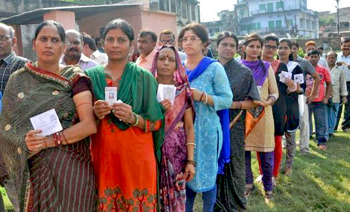Patna, Nov 5: Over 11 per cent turnout was recorded in the first two hours of voting in 57 Assembly constituencies spread over nine districts in the final phase of polling in Bihar.

"Around 11.23 per cent turnout has been reported from 57 Assembly constituencies going to polls in the fifth and final phase of elections. Polling is peaceful as we have not received information of any untoward incident so far," Additional Chief Electoral Officer (ACEO) R Lakshmanan said.
Polling is currently underway in nine districts of Madhubani, Supual, Araria, Kisanganj, Purnea and Katihar Madhepura, Saharsa, and Darbhanga in fifth and final phase of Bihar elections amid tight security arrangements.
As per an EC bulletin, Madhubani recorded 10.08 per cent of voting, Supual 14.25 per cent, Araria 8.77, Kisanganj 10.62 per cent, Purnea 12.36 per cent, Katihar 9.50 per cent, Madhepura 13.48 per cent, Saharsa 7.18, and Darbhanga 14 per cent.
Supaul district recorded a maximum turnout of 14.25 per cent while Saharsa recorded the lowest turnout of 7.18 per cent till 9 AM.
More than five (5.58) per cent turnout was recorded in the first one hour of polling in these districts.
Voting began at 7 AM amid tight security in 57 constituencies of nine districts.
Prominent personalities who cast their vote in first two hours included BJP national spokesman Shahnawaz Hussain and JD(U) national president Sharad Yadav.
"It is always good experience to vote in your own assembly constituency. I could not vote in my home constituency during Lok Sabha polls due to my engagements in Lok Sabha elections but I always manage to vote in my home constituency during Assembly elections," Hussain said after casting his vote at Kosi Project booth in Supaul town.
Hussain, who was seen standing in a queue waiting for his turn to vote, said that he has voted for Bihar's development.
JD(U) president Sharad Yadav, who cast his vote at Adarsh Middle School in Madhepura town, appealed to people to vote for Bihar's development and future.





Comments
Add new comment